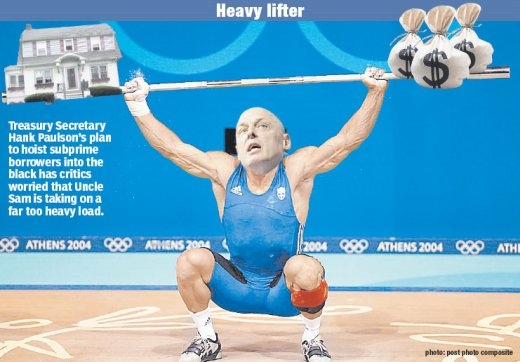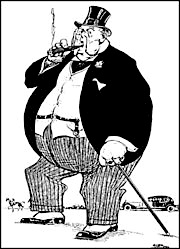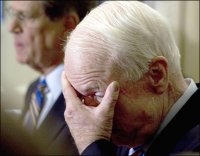
[Photoshop by NY POST]
WASHINGTON POST: At the final, critical meeting in negotiations on the $700 billion Wall Street bailout — the last round of talks began at 10:40 p.m. Saturday and ended around 12:25 a.m. this morning — Treasury Secretary Hank Paulson was so short of breath that lawmakers called the Capitol physician because they were so concerned. Paulson, 62, a former Dartmouth offensive tackle, told lawmakers he was fine and waved off the doctor, despite working around the clock for several days. But as Paulson and Sen. Chuck Schumer (D-N.Y.) later walked to the microphones to address the media, they were locked arm in arm. Treasury confirmed moments ago that Schumer was steadying Paulson, helping him walk. MORE
 ASSOCIATED PRESS: The proposal to bail out U.S. financial markets to the tune of up to $700 billion creates a lot of potential short-term winners, as well as some losers. Wall Street and the banking industry are perhaps the biggest winners. Scores of banks and other financial institutions faced with going under stand to gain a lifeline that should allow them to start making loans again. There are other winners, too, if the bailout works as intended: anyone soon trying to borrow money — for cars, student loans, even to open new credit card accounts. Top executives at troubled financial institutions, on the other hand, are in the losing column because the proposal would limit their compensation and rules out “golden parachutes.”
ASSOCIATED PRESS: The proposal to bail out U.S. financial markets to the tune of up to $700 billion creates a lot of potential short-term winners, as well as some losers. Wall Street and the banking industry are perhaps the biggest winners. Scores of banks and other financial institutions faced with going under stand to gain a lifeline that should allow them to start making loans again. There are other winners, too, if the bailout works as intended: anyone soon trying to borrow money — for cars, student loans, even to open new credit card accounts. Top executives at troubled financial institutions, on the other hand, are in the losing column because the proposal would limit their compensation and rules out “golden parachutes.”
Investors, including the millions of people who hold stock in their 401(k) and pension plans, should benefit. Failure  to reach a deal over the weekend could have sent stock markets around the world tumbling on Monday. Homeowners faced with foreclosure or those who have lost their homes get little help from the agreement. Nor will it help people whose houses are worth less than what they owe get refinancing or take out equity loans. It would do little to halt the slide in home values that are one of the root causes of the current economic slowdown. MORE
to reach a deal over the weekend could have sent stock markets around the world tumbling on Monday. Homeowners faced with foreclosure or those who have lost their homes get little help from the agreement. Nor will it help people whose houses are worth less than what they owe get refinancing or take out equity loans. It would do little to halt the slide in home values that are one of the root causes of the current economic slowdown. MORE
RELATED: Draft of the Plan (pdf)
 FRANK RICH: But even that wasn’t the top political threat McCain faced last week. Bigger still was the mounting evidence of the seamless synergy between his campaign and Fannie Mae and Freddie Mac, the mortgage monsters at the heart of the housing bust that set off our current calamity. Most of all, it was the fast-moving events on that front that precipitated his panic to roll out his diversionary, over-the-top theatrics on Wednesday. What we were learning — through The New York Times, Newsweek and Roll Call — was ugly. Davis Manafort, the lobbying firm owned by McCain’s campaign manager, Rick Davis, had received $15,000 a month from Freddie Mac from late 2005 until last month. This was in addition to the $30,000 a month that Davis was paid from 2000 to 2005 by the so-called Homeownership Alliance, an advocacy organization that he headed and that was financed by Freddie and Fannie to fight regulation. MORE
FRANK RICH: But even that wasn’t the top political threat McCain faced last week. Bigger still was the mounting evidence of the seamless synergy between his campaign and Fannie Mae and Freddie Mac, the mortgage monsters at the heart of the housing bust that set off our current calamity. Most of all, it was the fast-moving events on that front that precipitated his panic to roll out his diversionary, over-the-top theatrics on Wednesday. What we were learning — through The New York Times, Newsweek and Roll Call — was ugly. Davis Manafort, the lobbying firm owned by McCain’s campaign manager, Rick Davis, had received $15,000 a month from Freddie Mac from late 2005 until last month. This was in addition to the $30,000 a month that Davis was paid from 2000 to 2005 by the so-called Homeownership Alliance, an advocacy organization that he headed and that was financed by Freddie and Fannie to fight regulation. MORE
